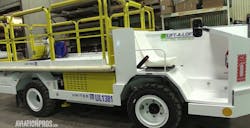The federal Transportation Security Administration is rolling out a pilot program to ease travel for some fliers, but officials at McCarran International Airport say they have no plans to join the trial.
Randall Walker, director of aviation for Clark County, said he's concerned that the Bush administration's Registered Traveler program will fail to create efficiencies at security checkpoints.
The administration said Thursday it will go forward with a summer launch of Registered Traveler, which calls for dedicated security lanes to minimize wait times for fliers who submit to a background check and provide fingerprints or iris scans.
Officials are looking for 10 to 20 airports around the United States to join Registered Traveler. So far, just one airport - Orlando International - has signed on.
Registered Traveler calls for airports to contract out administration of the program to private companies, who will develop implementation proposals based on each airport's specific logistical, security and traffic profile. The program's costs will be covered partly by enrollment fees charged to participating passengers.
A Wednesday report in USA Today said several airports around the nation have balked at joining Registered Traveler, mostly because they're uncertain that it will benefit all fliers.
Walker said the Registered Traveler program the federal government is establishing is different from proposals that immediately followed the terrorist attacks on Sept. 11, 2001. The theory then, Walker said, was that air passengers willing to undergo a background check and provide biometric profiles would merit "some lesser level of scrutiny at checkpoints," which would in turn reduce the need for screening personnel.
However, the sole perk Walker can see in today's version of Registered Traveler is that participants will face shorter security lines.
"The only thing we're absolutely told is a benefit of the program is that if you pay a fee and go through a (background) check, you'll get a special lane," Walker said. "But there's no reduction in screening procedures. Our concern is that this is a way to pay to get to the front of the line. If that is the case, it would speed up the process for some passengers and lengthen it for everyone else. The TSA has not indicated what, if any, screening would be different. There would be no efficiencies in the resources you take to screen people, since you have to dedicate a number of people to a lane irrespective of how many people go through it."
Walker said understaffed screening functions have already lengthened security lines at McCarran, the nation's fifth-busiest airport.
Since last fall, he estimated, wait times at checkpoints have increased about 10 minutes. A week ago, the Transportation Security Administration had 930 security workers at McCarran, down from 1,010 in the fall, and below the 1,054 employees required for full staffing.
Registered Traveler debuts as McCarran officials eye looming constraints on the airport's capacity.
Statistics from the Airports Council International-North America show McCarran hosted 44.3 million passengers in 2005. That was up from nearly 41.5 million fliers in 2004.
At a presentation before the Clark County Commission in January, McCarran officials said they are monitoring the airport's ability to keep up with growth in the airport's visitor volume.
Each new hotel room in Las Vegas creates 320 additional air passengers, Walker said in January. The city has about 135,000 rooms in its inventory, but projections from the Las Vegas Convention and Visitors Authority show that figure could reach between 180,000 and 210,000 total rooms by 2015. That would translate into anywhere from 14.4 million to 24 million new fliers.
McCarran's annual passenger capacity is 53 million, based on surrounding development that limits the addition of new runways. It's scheduled to reach that passenger ceiling in 2011.
A second international airport planned in the Ivanpah Valley isn't expected to open before 2017.
Nico Melendez, a spokesman for the Transportation Security Administration, said he hasn't discussed Registered Traveler's potential burdens with Walker or other airport executives. He acknowledged that all registered travelers will "go through some level of screening."
Melendez added that the long-term benefits of Registered Traveler "will not be realized until the program is in full effect." Plus, those advantages will vary by airport, he said.
"Airports have the tools to come up with a proposal and submit it to us," Melendez said. "Whatever the marketplace decides would be an effective tool, airports could come to us with a proposal and we will make decisions based on the proposal."
Melendez added that he is "not aware" of Walker's concerns about longer lines for nonregistered fliers being an issue for other airport executives.
Melendez said Registered Traveler's success would depend on the number of airports willing to offer it. Thus far, according to USA Today, four airports have declined to participate in Registered Traveler, while a dozen more are undecided about joining.
Melendez said he didn't know which airports have said they will not enroll in the program.
USA Today reported that airports in Los Angeles, Cincinnati, San Jose and Indianapolis will start up Registered Traveler in the summer.
Bill Connors, executive director and chief operating officer of the National Business Travel Association in Washington, D.C., said Orlando International Airport's experiences with Registered Traveler shows the promise of the initiative.
Since Orlando International unveiled its privately managed "Clear" program in July, 16,000 fliers have paid $80 each to enroll, Connors said. Participants include travelers who don't live in the Orlando area, but who visit frequently on business and want expedited security check-in when they fly out, Connors said.
Orlando International officials didn't respond to media queries before deadline.
Connors said "proper queue management" would prevent security delays among unregistered travelers. At Orlando International, he said, 10 percent to 12 percent of fliers belong to Registered Traveler, and Registered Traveler uses 6 percent of the airport's checkpoint lanes.
"There are a lot more people going through the Registered Traveler lanes without impacting other lanes," Connors said. "They're disproportionately going through. It's taking more people out of the mix, so nonregistered travelers are getting through faster as well. It's easing the burden on everyone else."
He said the U.S. government's insistence that Registered Traveler efforts nationwide be interoperable will boost the initiative's adoption.
"Just from a competitive standpoint, ports that don't have this will be at a disadvantage," Connors said.
But Walker said he isn't worried about McCarran's ability to compete with other airports.
"Right now, talking to my (industry) colleagues, I don't see a groundswell of people jumping at (Registered Traveler)," he said.
Copyright 2005 LexisNexis, a division of Reed Elsevier Inc. All rights reserved.
Terms and Conditions | Privacy Policy
News stories provided by third parties are not edited by "Site Publication" staff. For suggestions and comments, please click the Contact link at the bottom of this page.





